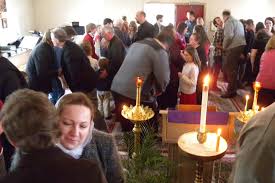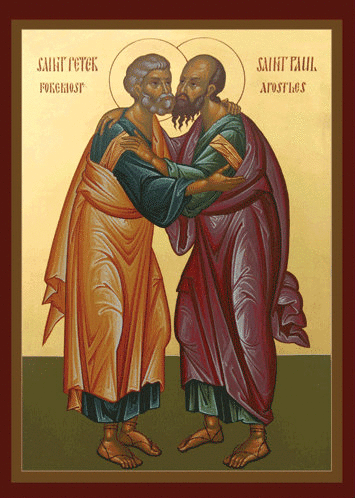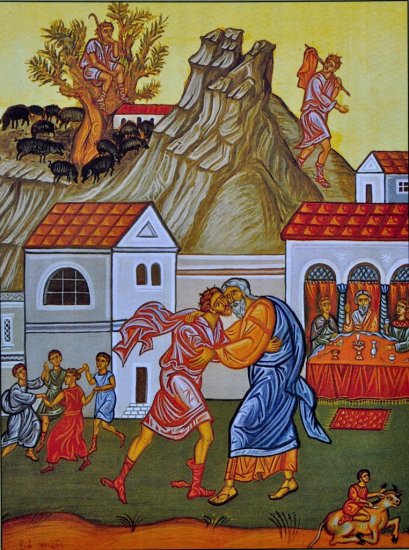Here it is in a nutshell: If you hesitate to come to Forgiveness Vespers this Sunday because someone you are mad at might be there – someone you haven’t made up with, someone you have not apologized to, someone you have not forgiven – if you die like this, get hit by a truck or get shot on the way home (you readers who are not in the United States, please understand), you’ll probably go to Hell. If there is anyone you haven’t forgiven, your salvation is in danger.
Because of this Sunday’s Gospel (Matthew 6:14-21), the day is popularly called Forgiveness Sunday. Orthodox in the Slavic tradition normally serve Forgiveness Vespers, as do an increasing number of Greek and Antiochian Orthodox parishes. This is a beautiful way to enter Great Lent. At the end of Vespers, all come forward and one by one ask each other’s forgiveness: “Forgive me a sinner.”  “Forgive me a sinner.” as we exchange the peace in the Orthodox way and respond to each other “God forgives you, and I forgive you.” Western Ash Wednesday is individualistic and a bit forbidding. One by one people receive the ashes and are told, “Remember, O man, that you are dust and to dust you shall return.” And that’s the truth. It’s good to remember our mortality as we begin Lent. The Orthodox entrance into Lent is communal and sweet, filled with love and forgiveness. I think it is an even better way to begin Lent.
“Forgive me a sinner.” as we exchange the peace in the Orthodox way and respond to each other “God forgives you, and I forgive you.” Western Ash Wednesday is individualistic and a bit forbidding. One by one people receive the ashes and are told, “Remember, O man, that you are dust and to dust you shall return.” And that’s the truth. It’s good to remember our mortality as we begin Lent. The Orthodox entrance into Lent is communal and sweet, filled with love and forgiveness. I think it is an even better way to begin Lent.
However, the rite of saying “Forgive me, a sinner” is only the beginning of the process. It opens our hearts to God and each other. But forgiveness itself requires a whole lot more than words.
Forgiveness: “If you forgive men their trespasses your heavenly Father will also forgive you, but if you do not forgive men their trespasses neither will your Father forgive your trespasses.” Is that clear enough? And it’s no secret, for every day were pray this terrifying prayer: “Forgive us our trespasses as we forgive those who trespass against us.” Lord, if I refuse to forgive someone, please don’t forgive me. Lord, if I hold a grudge against someone, please hold a grudge against me. We hear this again and again in the New Testament.
Take the parable of the wicked servant who was forgiven a huge debt by his master, but who refused to forgive his fellow servant a small debt. The master was angry and had him killed! And, says Jesus, “so will my heavenly Father do to you if you do not forgive your brothers from your heart”! Matthew 18:35 Again, is that clear enough? And it’s true. God has built it into the nature of things that a hard heart can kill our immortal soul, and as we go dead on the inside, Hell can begin even on this side of death.
Therefore this Sunday, before you go into Lent, if there is anyone anywhere you have not apologized to, apologize. Say “I’m sorry” – or better yet “Forgive me”, because that may elicit a response. Be tough on yourself: Say it, or write it, or e-mail it, or if the person is departed, ask the angels to convey the message. Even if you think you’ve done nothing wrong, if you are at odds with someone and haven’t tried to make up, say: “If I’ve done anything to offend you, I’m sorry.” For the truth is if there is someone you’re not getting along with, likely you were part of the problem – even if you didn’t intend it, even if you don’t know what it was, even if you’re too proud to consider the possibility.
if there is anyone anywhere you have not apologized to, apologize. Say “I’m sorry” – or better yet “Forgive me”, because that may elicit a response. Be tough on yourself: Say it, or write it, or e-mail it, or if the person is departed, ask the angels to convey the message. Even if you think you’ve done nothing wrong, if you are at odds with someone and haven’t tried to make up, say: “If I’ve done anything to offend you, I’m sorry.” For the truth is if there is someone you’re not getting along with, likely you were part of the problem – even if you didn’t intend it, even if you don’t know what it was, even if you’re too proud to consider the possibility.
My experience after 53 years as a pastor is that most hurts are unintentional. It’s just that people are preoccupied with their own problems or overcome by them, and we just get in the way at the wrong time. Or people mis-speak or mis-act and never notice it. I’ve done a lot of counseling, I’ve heard a lot of Confessions, I’ve done a lot of living, I’ve done a lot of unintentional mis-speaking and mis-acting myself. And I’m convinced that most of the time people who hurt each other did not mean to do so. The result is that both sides think that the other was in the wrong.
And the fact is, if you have not tried to make up, you are in the wrong for precisely that reason, because you haven’t made it clear that you will forgive. Again, I’m convinced that when people don’t apologize to us, often the reason is because they’re afraid if they say it they’ll be rejected, afraid we’ll beat ’em over the head with it. So make it easy for people to apologize. Be like the  father of the prodigal son who, before his son could say a word of apology, rushed out to greet him, so his son would know he would be forgiven. Be like God who has rushed out to greet us in our Lord Jesus Christ, so that before we have said even a word of repentance, we already know we will be forgiven.
father of the prodigal son who, before his son could say a word of apology, rushed out to greet him, so his son would know he would be forgiven. Be like God who has rushed out to greet us in our Lord Jesus Christ, so that before we have said even a word of repentance, we already know we will be forgiven.
And if you are easy with others, that will make up for the thousand times God has been easy with you, when you never told him you were sorry. Despite that, He has kept pouring out His blessings on you. Be like Him. “Be merciful as your Father is merciful.” (Luke 6:36) Do not be like Queen Elizabeth I. She was once angry with someone and was told, “But your majesty, God has forgiven him.” According to the story she replied “God may forgive him, but I never will!” I hope she got over that. I mean, who do we think we are? holier than God? God forgives but we won’t? Forgive easily, quickly.
What exactly does it mean to forgive? People are often confused about this. Forgiveness is not a feeling. It is an action. * Or actually often a lack of an action. Forgiveness means not getting even, not paying back. In Confession I almost always the Penitent, “Is there anyone you have not forgiven?” Sometimes the Penitent responds, “I thought I’d forgiven, but maybe I haven’t, because the anger keeps coming back; it still hurts me.” I then sometimes respond: “Have you hired a ‘hit man” to ‘take him out”‘? (So far none have answered “Yes”!) The Penitent has confused forgiving with forgetting. Forgiveness consists of not paying the other person back – and also the positive action of trying to making up with the other person, if possible.
- Just as repentance is an action. Repentance does not consist of feeling sorry. True repentance is a turning away from sin.
Let’s take a difficult case: Sometimes the person who has hurt you never says he’s sorry? Then if he shows any sign of wanting to make up, any sign of being sorry, accept it as an apology. My father was like that; he just could not bring himself to say those words “I’m sorry”. It would have made life easier for him and for us if he could have said it. But he would show he was sorry in a multitude of ways. OK, that’s good enough. It was obvious my dad was sorry. I wish I had more quickly accepted that as an apology, because I knew he loved me.
Now a far more difficult case. What if the other person doesn’t show even a sign of being sorry? What if he’s done you wrong and you’ve given him every opening, and he could not care less? Then, if you’ve honestly tried, and he’s not interested in making up, don’t waste your breath on him.
Of course, you must not pay him back, or get even. But if he is not open to being reconciled, then you must forgive in your heart – not for his sake, but for yours, for the s ake of your immortal soul. Because the great danger in hanging onto grudges – in not forgiving people, in forever being angry at people – is what it will do to you. It will give that unrepentant rat power over you forever. If you keep clinging to the hurt, it will allow him to destroy your inner spirit and make you miserable. It will keep you from real prayer. You’ll be mouthing prayers but thinking not about God and his love, but about that rotten scoundrel and how nasty he was to you. It will distract you from loving. It can corrupt and corrode your spirit, and in the end, if you don’t give it up, it can destroy your soul. The hard heart, holding a grudge, is a foretaste of the misery of Hell. And if you don’t forgive and let it go, finally it will turn into the Real Thing. Don’t let anyone do that to you
I do not mean to make this sound easy. Forgiving – not paying back, not getting even – can be extremely hard to do. What if the person to be forgiven has just invaded a school and killed your son or daughter? or your grandson or granddaughter? which happens all too often in America, these days. Or what if the person to be forgiven is a man who has harassed and abused you or your child? How do you forgive? Or what if bombs are raining down on you for no reason, destroying your cities, your culture, killing your innocent loved ones? Over 30,000 innocents dead in Gaza thus far. Ukraine (which we seem almost to have forgotten) has suffered about 30,000 soldiers dead, about 10,000 civilians – all of them innocents, the soldiers defending their homeland in the most unjust war imaginable. How would you forgive that?
When people sin against us, it is a wound to the soul; it is like a physical pain. There is no easy way to get past that. Forgetting the hurt is impossible to do. It will be a spiritual throb, perhaps a very long while. And trying to forget it is impossible, for as soon as we remember to forget it, we have remembered it again! If we keep digging into it, it will never heal.
Sacramental Confession is part of the healing process. We go to the “spiritual doctor” who prescribes the medicine to take till the hurt just goes away. The medicine is usually this: Pray much. Every time the remembrance of the hurt rises in your heart or mind, do not dig into the wound. Immediately put it down. Don’t dig into the wound, and do this again and again till finally the pain goes away. If the wound is deep, it will likely never be healed till in the Kingdom.
In Confession, almost always I quote C.S. Lewis who wrote (I paraphrase) that when Christ told Peter to forgive seven times seven times, this meant for every sin. Forgive that sin, put it down again and again and again and again and again and again and again, and then keep forgiving till the pain is gone. Do not ever let someone else’s sin eat up your inner life
Let me tell you two of my favorite stories about forgiveness:
1 One Sunday Saint John the Merciful, Patriarch of![]() Alexandria, just before the Great Entrance of the Divine Liturgy, remembered that there was a priest in the city who was angry at him, with whom he had not made up. And then he remembered the words of our Lord: “If you bring your gift to the altar and there remember that your brother has something against you, leave your gift before the altar and go. First make peace with your brother, and then come and lay your gifts before the altar.” Matthew 5:23-24 So before he placed the Holy Gifts on the Altar, Patriarch John left the procession – I wonder how long the poor choir had to keep singing! – and he sent for his brother priest, made peace and only then did he come back to place the Holy Gifts on the altar.
Alexandria, just before the Great Entrance of the Divine Liturgy, remembered that there was a priest in the city who was angry at him, with whom he had not made up. And then he remembered the words of our Lord: “If you bring your gift to the altar and there remember that your brother has something against you, leave your gift before the altar and go. First make peace with your brother, and then come and lay your gifts before the altar.” Matthew 5:23-24 So before he placed the Holy Gifts on the Altar, Patriarch John left the procession – I wonder how long the poor choir had to keep singing! – and he sent for his brother priest, made peace and only then did he come back to place the Holy Gifts on the altar.
2 There was a monk who had led a less than exemplary life, but nevertheless as he lay on his deathbed was blissful, not worried at all. His fellow monks said: “With the kind of life you’ve led, why aren’t you afraid of dying? afraid of God’s judgment?” The man answered, “Because I have forgiven everyone who ever hurt me, so I know God will have to forgive me, too”. And he died a happy man.
Let’s bring it home: Forgive. Forgive. FORGIVE!
Next Week: The Sunday of the Triumph of Orthodoxy. The Triumph?!

Dear Fr. Bill,
Your blessing.
You write about “ trying to understand and forgive our politicians who don’t even try to solve our gun violence…” as if solving the violence were in their hands. It is not in anyone’s hands. What must be addressed, as we have seen in so many of these shootings, is our hearts – the hearts, certainly, of the perpetrators/shooters, but even more so, the hearts of those who have lived with, know or are aware of these shooters. It has been the case that there were warning signs ( as in the Fl shooter), that disturbing social media posts were reported, that abuses were reported (as in the Olympics gymnastics team)… yet no one in law enforcement, in organization governance, etc did anything about any of it. What does it say about any of us that we do not see “our neighbor” lost, abandoned, hurting, reaching out by posting on social media? As a nation, we have lost our way by simply forgetting about our neighbor. None of this is to say that some gun laws ought not to be changed; they should. I just think there is no emphasis whatsoever on the greater problem, which is how we treat our brother, neighbor, friends, students, and perceived lessers. Also, the non-stop exposure to the violence that is glorified by the games, the movies, the music, etc is so pervasive, that to a mind already saddled with so many other things that have gone so wrong in their young lives, the temptation is to commit similar violence. The disruption from which our society suffers has been wrought by the violence these children suffer, which includes divorce, loss of family structure, at-will-gender-bending, the proliferation of drugs, over -sexualization of everything, the glorification of violence, and most of all, the glorification of self-interest. We, who are all neighbors, will continue to reap the ravages of this violence unless we change our hearts and minds and reach out to all our neighbors.
Kalo Stadio.
In Christ,
Eleftheria
God bless you, Eleftheria.
You speak the truth. The source of problems always lies in our hearts and minds, and in what society glorifies. However, some countries have low murder rates compared to ours and almost no mass killings: all of western Europe, even Canada just over our border, whose cultures are very similar to ours. Is this because their hearts have somehow been changed for the better? If so, why? how? What do they know that we Americans don’t?